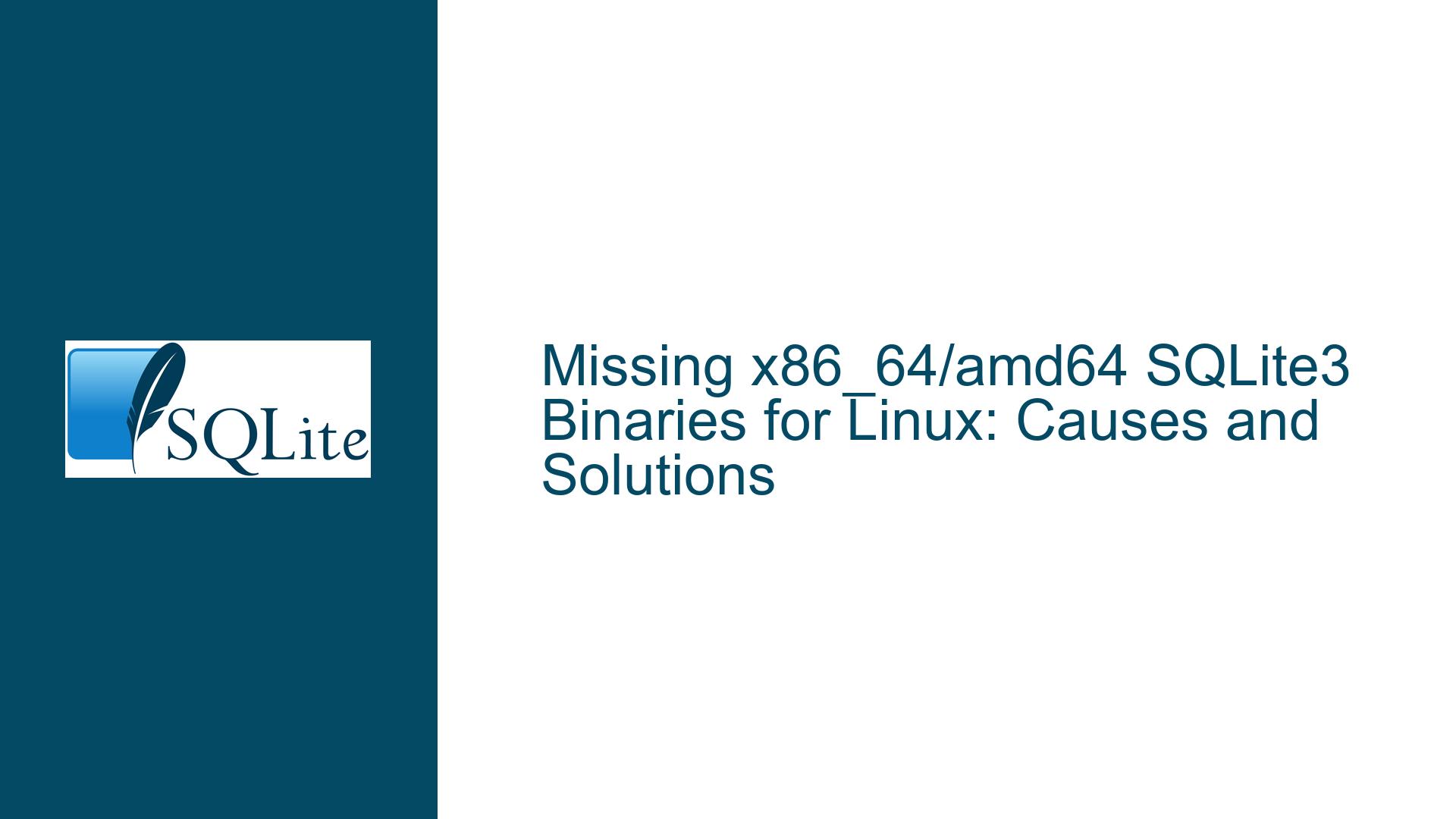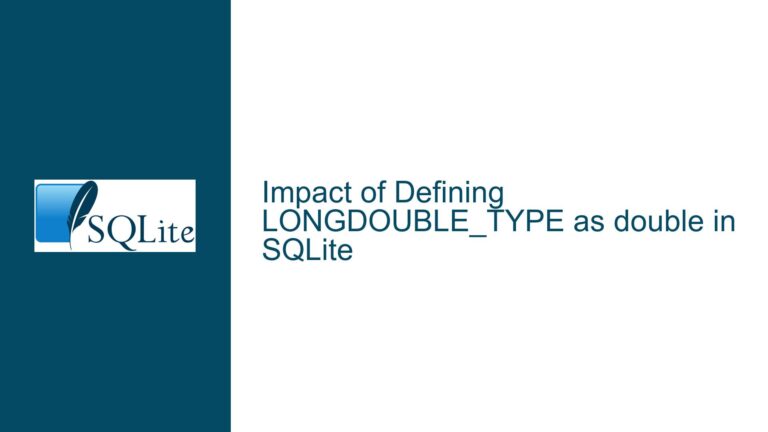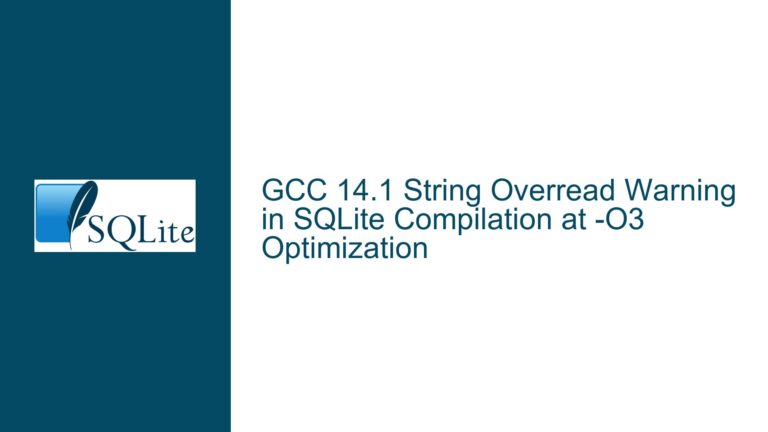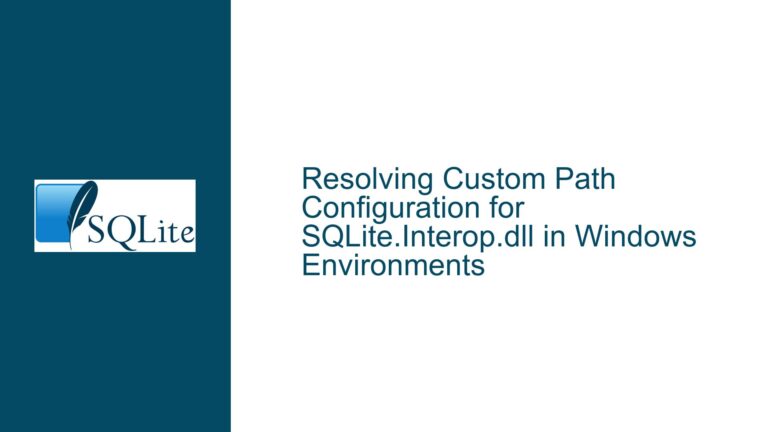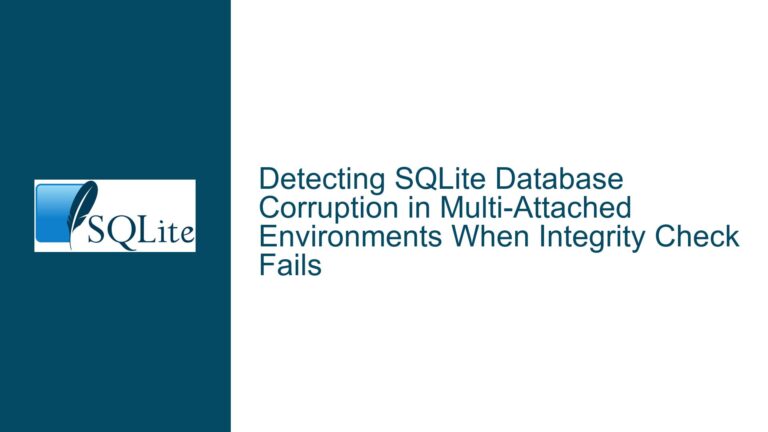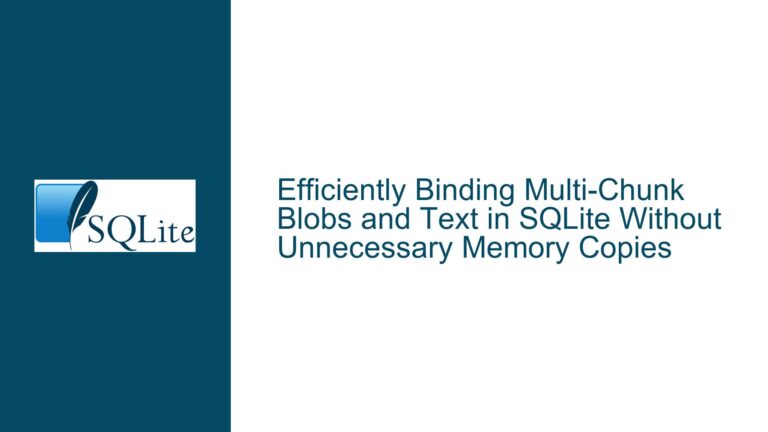Missing x86_64/amd64 SQLite3 Binaries for Linux: Causes and Solutions
Issue Overview: Absence of Precompiled 64-bit SQLite3 Binaries for Linux
The core issue revolves around the unavailability of precompiled 64-bit SQLite3 binaries for Linux on the official SQLite download page. While 32-bit binaries are readily available, users seeking 64-bit versions are left with limited options, primarily compiling the binaries from source or resorting to unconventional workarounds. This discrepancy is particularly puzzling given the widespread adoption of 64-bit architectures in modern computing environments, especially for Linux-based systems.
The absence of 64-bit binaries poses several challenges. First, it forces users to engage in a more complex and time-consuming process of compiling the binaries from source, which may not be feasible for all users, particularly those without a technical background. Second, it creates a disparity between the availability of 64-bit binaries for other platforms (such as Windows) and Linux, leading to confusion and frustration among users. Third, the lack of 64-bit binaries may inadvertently encourage the use of outdated or less efficient 32-bit software, which can have performance implications, especially for resource-intensive applications.
The discussion also highlights a broader issue: the tension between maintaining backward compatibility with 32-bit systems and embracing the modern 64-bit ecosystem. While 32-bit systems are still in use, their prevalence has significantly diminished, particularly in the Linux world where 64-bit architectures dominate. This raises questions about the rationale behind prioritizing 32-bit binaries over 64-bit ones, especially when the latter are more aligned with current hardware and software trends.
Possible Causes: Why 64-bit SQLite3 Binaries for Linux Are Missing
Several factors contribute to the absence of precompiled 64-bit SQLite3 binaries for Linux. Understanding these causes is essential for devising effective solutions and addressing the underlying issues.
1. Historical Context and Backward Compatibility:
One of the primary reasons for the continued availability of 32-bit binaries is the need to support legacy systems and applications. While 64-bit architectures have become the standard, there are still numerous 32-bit systems in operation, particularly in embedded systems, older hardware, and specific use cases where upgrading is not feasible. SQLite, being a widely used database engine, must cater to this diverse user base, which includes both modern and legacy systems. This dual support necessitates the maintenance of 32-bit binaries, even at the expense of prioritizing 64-bit ones.
2. Resource Constraints and Development Priorities:
The SQLite project operates with limited resources, relying heavily on community contributions and donations. Compiling, testing, and distributing binaries for multiple platforms and architectures require significant effort and infrastructure. Given these constraints, the project may prioritize maintaining 32-bit binaries due to their broader compatibility and the perceived lower demand for 64-bit Linux binaries. This prioritization is further compounded by the fact that many Linux users are accustomed to compiling software from source, reducing the immediate need for precompiled binaries.
3. Platform-Specific Considerations:
The availability of 64-bit binaries for other platforms, such as Windows, suggests that platform-specific considerations play a role in this discrepancy. Windows, for instance, has a more centralized distribution model, with a significant portion of users relying on precompiled binaries. In contrast, Linux users often have access to package managers and repositories that simplify the process of obtaining and compiling software. This difference in user behavior and distribution mechanisms may influence the decision to prioritize 64-bit binaries for Windows over Linux.
4. Misalignment with Modern Hardware Trends:
The discussion reveals a misalignment between the availability of SQLite binaries and modern hardware trends. With the majority of contemporary hardware supporting 64-bit architectures, the absence of 64-bit binaries for Linux seems counterintuitive. This misalignment may stem from a lag in adapting to evolving hardware landscapes, particularly in the context of open-source projects with limited resources. The result is a gap between user expectations and the available offerings, leading to frustration and the need for alternative solutions.
Troubleshooting Steps, Solutions & Fixes: Addressing the 64-bit SQLite3 Binary Gap
Resolving the issue of missing 64-bit SQLite3 binaries for Linux requires a multifaceted approach, encompassing both immediate workarounds and long-term solutions. Below, we explore various strategies to address this gap, ranging from user-level fixes to broader project-level considerations.
1. Compiling SQLite3 from Source:
For users comfortable with the command line and development tools, compiling SQLite3 from source is a viable solution. This approach provides the flexibility to generate 64-bit binaries tailored to specific system configurations. The process typically involves downloading the SQLite amalgamation source code, configuring the build environment, and executing the compilation commands. While this method requires technical expertise, it ensures that users have access to the latest features and optimizations.
To streamline the compilation process, users can leverage containerization tools like Docker. By creating a Dockerfile that automates the build process, users can generate 64-bit SQLite3 binaries in a consistent and reproducible manner. This approach not only simplifies the compilation process but also isolates it from the host system, reducing the risk of conflicts or dependencies issues.
2. Leveraging Fossil SCM as an Alternative:
An unconventional yet effective workaround involves using the Fossil SCM (Source Code Management) system, which includes a built-in SQLite shell. Fossil provides precompiled 64-bit binaries for Linux, making it a convenient alternative for users seeking a 64-bit SQLite environment. By downloading and using the Fossil binary, users can access the SQLite shell without the need for compiling from source.
This approach is particularly useful for users who primarily need the SQLite shell for interactive use or scripting. While it does not replace the full SQLite library, it offers a practical solution for those who require immediate access to a 64-bit SQLite environment. Additionally, this method highlights the interconnectedness of SQLite with other projects and the potential for cross-project solutions to address specific user needs.
3. Advocating for Official 64-bit Binaries:
Long-term resolution of this issue requires advocacy and community engagement to encourage the SQLite project to prioritize the distribution of 64-bit binaries for Linux. Users can contribute to this effort by raising awareness, submitting feature requests, and participating in discussions on forums and mailing lists. Highlighting the growing demand for 64-bit binaries and the benefits they offer can help shift the project’s priorities and resource allocation.
Community contributions can also play a crucial role in this process. By offering to assist with the compilation, testing, and distribution of 64-bit binaries, users can alleviate some of the resource constraints faced by the SQLite project. Collaborative efforts, such as creating automated build pipelines or maintaining unofficial repositories of 64-bit binaries, can bridge the gap until official support is available.
4. Exploring Third-Party Distributions and Repositories:
In the absence of official 64-bit binaries, users can explore third-party distributions and repositories that provide precompiled SQLite binaries for Linux. Many Linux distributions and package managers include SQLite as part of their standard repositories, often offering 64-bit versions. By leveraging these sources, users can obtain 64-bit SQLite binaries without the need for manual compilation.
However, users should exercise caution when relying on third-party sources, ensuring that the binaries are from reputable and trustworthy providers. Verifying the integrity and authenticity of the binaries is essential to avoid security risks and compatibility issues. Additionally, users should be aware of potential differences in versioning and feature sets between official and third-party distributions.
5. Optimizing Performance and Compatibility:
For users who must rely on 32-bit binaries due to specific constraints, optimizing performance and compatibility becomes crucial. While 32-bit binaries may not fully leverage the capabilities of modern 64-bit hardware, there are strategies to mitigate potential performance bottlenecks. These include optimizing database schemas, indexing strategies, and query execution plans to reduce resource consumption and improve efficiency.
Additionally, users can explore compatibility layers and emulation tools that allow 32-bit binaries to run on 64-bit systems. While these solutions may introduce some overhead, they can provide a temporary workaround until 64-bit binaries become available. Balancing performance and compatibility is key to ensuring a smooth user experience in the interim.
6. Engaging with the Broeder SQLite Community:
Finally, engaging with the broader SQLite community can provide valuable insights and support for addressing the 64-bit binary gap. By participating in forums, attending conferences, and collaborating with other users, individuals can share knowledge, exchange solutions, and collectively advocate for change. The SQLite community’s collective expertise and experience can serve as a powerful resource for overcoming challenges and driving improvements.
In conclusion, the absence of precompiled 64-bit SQLite3 binaries for Linux is a multifaceted issue with historical, technical, and resource-related dimensions. By understanding the underlying causes and exploring a range of solutions, users can navigate this challenge effectively. Whether through compiling from source, leveraging alternative tools, or advocating for official support, there are multiple pathways to achieving a 64-bit SQLite environment on Linux. As the computing landscape continues to evolve, addressing this gap will be essential for ensuring that SQLite remains a versatile and high-performance database solution for all users.
